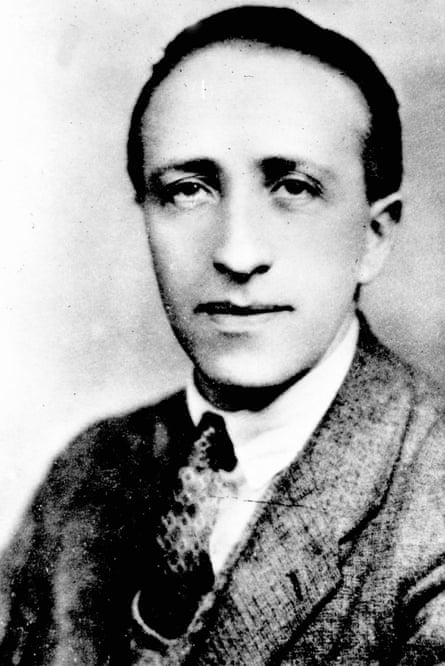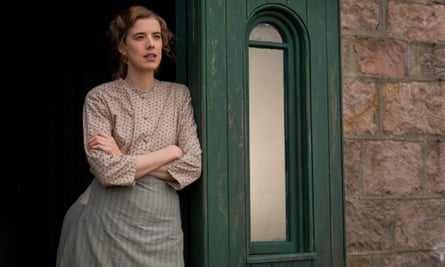The light fades on a way of life that is now changed utterly, but the song can still be heard. For anyone who grew up, as I did, in north-east Scotland in the rural hinterland of Aberdeen, the first novel in Lewis Grassic Gibbon’s trilogy A Scots Quair is an unforgettable evocation of a way of life that has slipped away (taking much with it that we’re well rid of). At the same time, it is a love song for a landscape and language still familiar – and precious – to a generation born long after he died.
Consequently, anyone who still responds to the rhythms of that speech, and who knows the contours of the place, will look forward to the film by Terence Davies next month, but with a tremor of trepidation. He has taken a cherished book – voted not long ago the Scots’ favourite novel – and for many people its characters and the flow of the story are so familiar that anyone who tampers with them will have to gang warily, as we might say.
For me this is still the place where loons and queans played at the ba, where orramen put on their suits for Sunday, where they still talked about farm servants being hired at feein’ markets, where bothy ballads were still sung, and where the dominie would have a leather strap hanging on the back of the classroom door. Happy days.
No doubt the film will meddle with the language for the sake of comprehension. But never mind. Sunset Song can take it, and if Davies’s treatment introduces another generation to Grassic Gibbon, all will be well. It’s a book that takes you into a different world. He wrote it in Welwyn Garden City, of all places, in the first years of the 1930s, and looked back to the countryside he knew as a boy – the rich farmland of the Mearns, just south of Aberdeen, which stretches from the mountains to the sea.
The story he weaves round the passionate character of Chris Guthrie, a woman who endures terrible suffering as well as fulfilling love, is rough and unforgiving in its picture of 20th-century feudalism before the first world war. Yet it’s also stamped with a nostalgia he can never quite cast off.
Above all, he portrays the cataclysmic impact of the war on a generation and their expectations. Chris loses her men, she has to cope with rumours of cowardice and desertion, and she sees the territory around her transformed. Life was hard for her – a cruel, incestuous father and a community that was often unforgiving in its iron-clad morality. But she was stirred by the power of the land, and therefore clung with her heart to a past that hadn’t been kind to her.
When we first meet her, she is lying in a field, and around her “the June moors whispered and rustled and shook their cloaks, yellow with broom and powdered faintly with purple – that was the heather but not the full passion of its colour yet … and maybe the wind would veer there in an hour or so and you’d feel the change in the life and strum of the thing, bringing a streaming coolness out of the sea”.

Grassic Gibbon – his real name was James Leslie Mitchell – was radical in the way he used language (as he was in politics) to convey feelings in descriptions that read as if they are the inner thoughts of people, rendered with a poetic pulse that he manages to sustain against the danger that the artificiality might get too much. The book’s personality is shaped by that language.
He developed – maybe invented is not too strong – a kind of word music of his own, without becoming as iconoclastic as Hugh MacDiarmid, who was writing poetry at the same time, in which he tried to re-invent a whole lowland Scots language that was consciously set up in opposition to English (which I once heard him describe as “a linguistic disease”, though admittedly he was drunk at the time). Grassic Gibbon’s prose, sometimes glorious, is stamped with individuality: he never seems to be imitating anyone else’s style, but going his own way.
Take the scene at the end of the book, in which the new minister in Kinraddie is dedicating the war memorial to four men who have perished, one of them Ewan Tavendale, Chris’s husband. Everyone has gathered near the ancient standing stones on the hillside for the ceremony. A piper plays The Flowers o’ the Forest (which some will never play except at a funeral or memorial) and Grassic Gibbon even writes out the tune on the page. The minister says that something perished with the young men that was older than themselves, “and we may believe that never again will the old speech and the old songs, the old curses and the old benedictions, rise but with alien effort to our lips”.
Though it will scandalise much of the neighbourhood, Chris is going to marry this minister, Robert Colquhoun, who evokes a rich past (for all its hardships and cruelties) and fears for the future. “So, lest we shame them, let us believe that the new oppressions and foolish greeds are no more than mists that pass. They died for a world that is past, these men, but they did not die for this that we seem to inherit.”
The world that Chris knew before the war delivered her much pain: a mother who took her own life, and young twins with her, a father who tried to seduce her, a husband whom she loved but was changed inside by war. Yet the feeling for the old ways, the old speech, throbs through the book and never goes away. What lies ahead for them all seems more threatening than anything they had known before.

The reason the story makes a natural drama is, in part, because Chris is one of the great women of 20th-century fiction, but also because the setting is so alluring. If Davies can capture something of the spirit of the landscape, and the tongue, he will deliver a gift. Kinraddie itself is a collection of farms – Blawearie, Peesie’s Knapp, Cuddiestoun and the rest – populated by characters that any country boy from those parts can recognise in an instant: Long Rob of the Mill, Pooty the shoemaker, Chae Strachan, Mr Gibbon the old minister, Mistress Munro. The intimacy of the place comes from their connection with the land off which they have to live. The sensuality of Chris and the pacifism of Long Rob in the face of war are rooted in the soil as much as the day-to-day habits of those who have to work in the fields.
I grew up in a place not unlike Kinraddie (we even had our own standing stones), and not far away from where Grassic Gibbon sited his fictional parish. This was half a century after the world conjured up by A Scots Quair. Much had gone – the fields were worked by horse and plough just before my time – but traces of the old ways were everywhere.
Sunset Song is a lament – and a cry of anger, too. As a novelist, Grassic Gibbon was pulling away from the sentimentality associated with the kailyard: the cabbage patch to which a particular group of writers at the end of the 19th century were consigned for their desire to romanticise life in Scotland. His characters would live real lives, and they would be raw. But he wrote with a profound feeling for the past. You can feel its pulse from the first description of Kinraddie lands – “won by a Norman childe … in the days of William the Lyon” – to the last page, when Chris hears the lament for her husband lost in the war – “the tune leaping up the moor and echoing across the loch”. As she prepares for her new life with Colqhuoun “they’d the last of the light with them up there, and maybe they didn’t need it or heed it, you can do without the day if you’ve a lamp quiet-lighted and kind in your heart”.

Comments (…)
Sign in or create your Guardian account to join the discussion